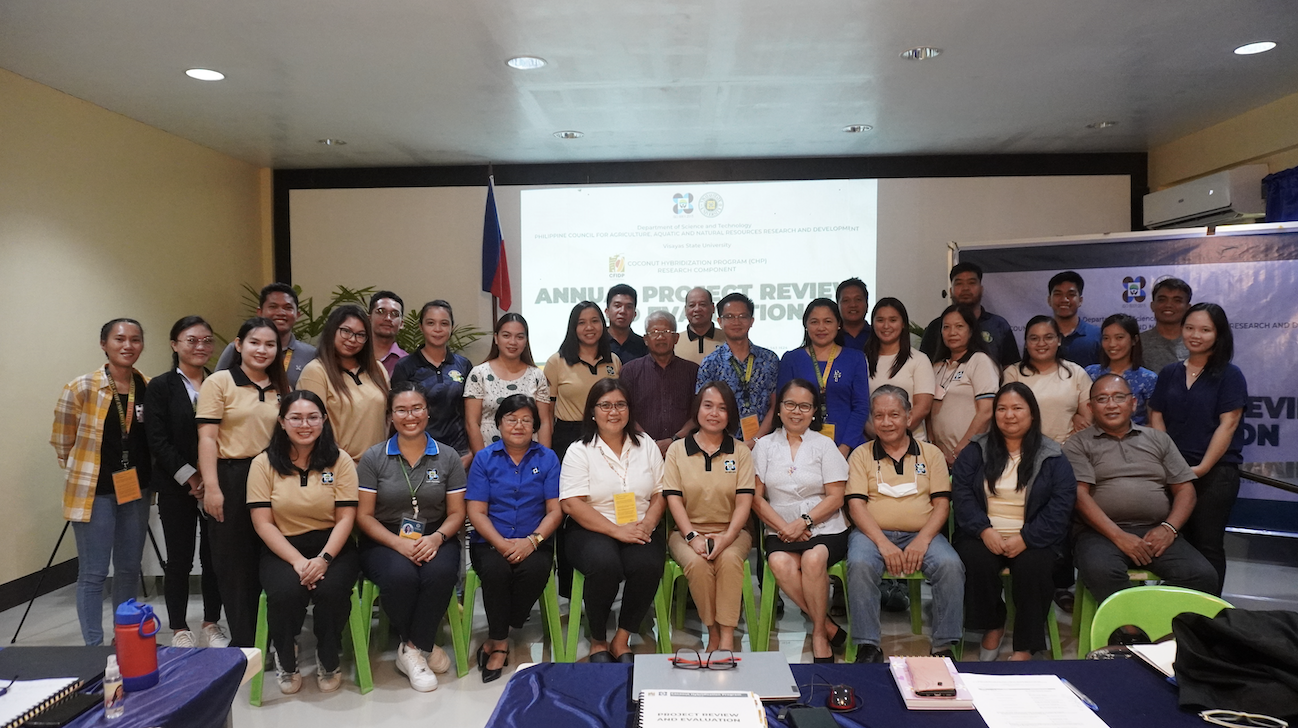
A larvae of Asiatic Palm Weevil found in Baybay City, Leyte (left) and one-year old coconut hybrids in the study sites at Ormoc City, Leyte (right). (Image credit: CRD, DOST-PCAARRD)
In an effort to support the local coconut farmers, two ongoing studies led by Visayas State University (VSU) seek ways to improve the nutrient and pest management of hybrid coconuts.
Funded by the Philippine Council for Agriculture, Aquatic and Natural Resources Research and Development of the Department of Science and Technology (DOST-PCAARRD), through the Coconut Farmers and Industry Development Plan (CFIDP) - Coconut Hybridization Program (CHP) research component, these projects were recently evaluated in a project review held at VSU, Baybay City, Leyte.

DOST-PCAARRD and VSU team during the project review and inception meeting of VSU-led projects under the Coconut Hybridization Program (CHP) research component. (Image credit: CRD, DOST-PCAARRD)
The project, “Development and Evaluation of Soil Fertility and Nutrient Management Strategies for Hybrid Coconut Farming in Eastern Visayas,” under the leadership of Dr. Suzette B. Lina, has begun characterizing the soil and determining the critical nutrient concentrations (CNC) in the established hybrid coconut farm in Ormoc, Leyte. This three-year project will develop a holistic and sound fertilization program for hybrid coconut production in Eastern Visayas.
During the review, Science and Technology (S&T) Consultant Juanito B. Sangalang highlighted the importance of doing a field survey to verify the identity of the coconut hybrids and estimate the yield in addition to the data provided by the farmers.
Meanwhile, the two-year project of Dr. Justine Bennette H. Millado, “Evaluation and Development of Biological and Biorational Control Agents for Sustainable Management of Asiatic Palm Weevils (APW) and other Important Pests Affecting Hybrid Coconut in Eastern Visayas,” initially identified the presence of APWs in the provinces of Leyte, Southern Leyte, Northern Samar, and Cebu.
APW is a lethal pest, infesting 5- to 20-year-old coconut palms with soft and tender trunk tissues. These infestations are usually hardly noticed, leading mostly to the death of the palms.
Dr. Divina M. Amalin, S&T consultant from De La Salle University (DLSU), suggested looking into the earliest symptoms in detecting APW such as foliage damage, for immediate detection and quick response.
According to Dr. Millado, controlling these APWs and other coconut pests is crucial to increasing the productivity of coconut hybrids. The project will develop and package an improved and S&T-based Integrated Pest Management (IPM) to control APWs.

DOST-PCAARRD representatives visited facilities and laboratories during the Annual Review and Inception Meeting of the projects on Coconut Hybridization Program at the Visayas State University. (Image credit: CRD DOST-PCAARRD)
In support of this initiative, the non-R&D project, “Upgrading of the Mass Production Laboratory for Biological Control Agents in VSU to Support Sustainable Pest Management of Coconut Hybrids and Intercrops in Eastern Visayas,” also led by Dr. Millado formally commenced to upgrade a central mass production, characterization, and evaluation laboratory for biological control agents in Region VIII.

Leilani D. Pelegrina, Director of the DOST-PCAARRD Crops Research Division (CRD), opens the annual review and inception meeting meeting of projects led by Visayas State University. (Image credit: CRD, DOST-PCAARRD)
The review and inception of these projects was attended by VSU’s Vice President for Research, Extension, and Innovation Maria Juliet C. Ceniza; National Coconut Research Center (NCRC) Director Marisel S. Leorna; Southern Leyte State University Professor John Paul Gapasin; DOST Region VIII representative Imelda S. Picorro; and representatives of the Philippine Coconut Authority’s Project Management Office (PMO), Davao Research Center, and Regional Office VIII..
The activity was led by the Crops Research Division (CRD) through its director, Ms. Leilani D. Pelegrina. Key personnel from the Institution Development Division (IDD), Finance and Administrative Division (FAD)-Accounting Section, and Office of the Executive Director for Research and Development (OED-RD) of DOST-PCAARRD also joined the activity.

